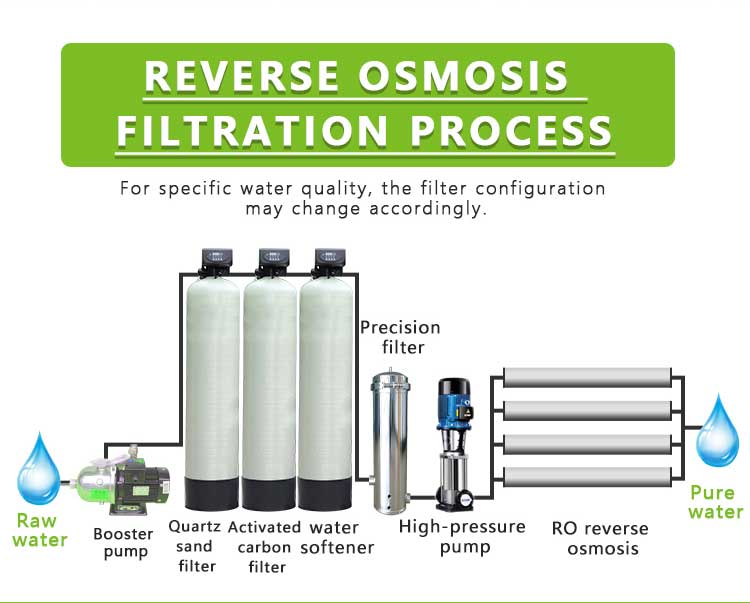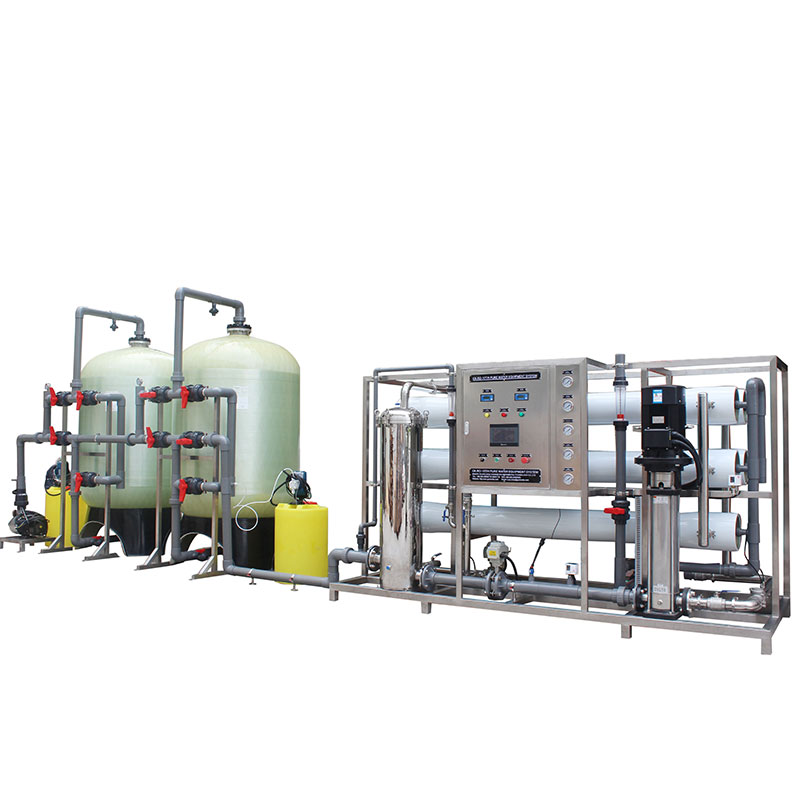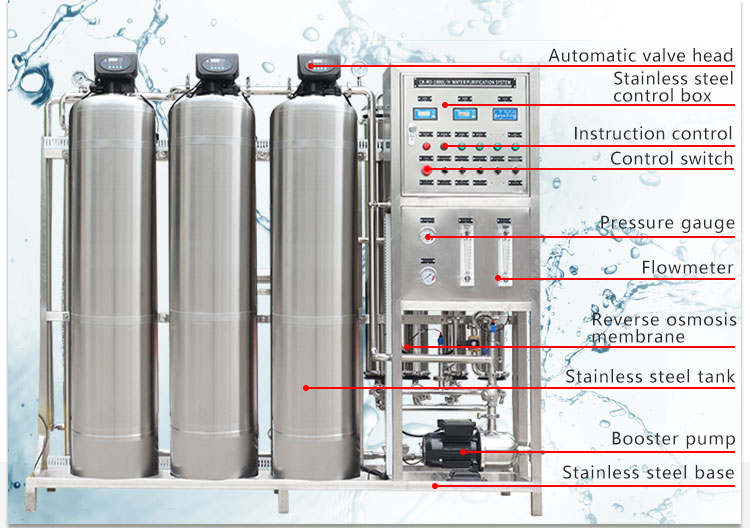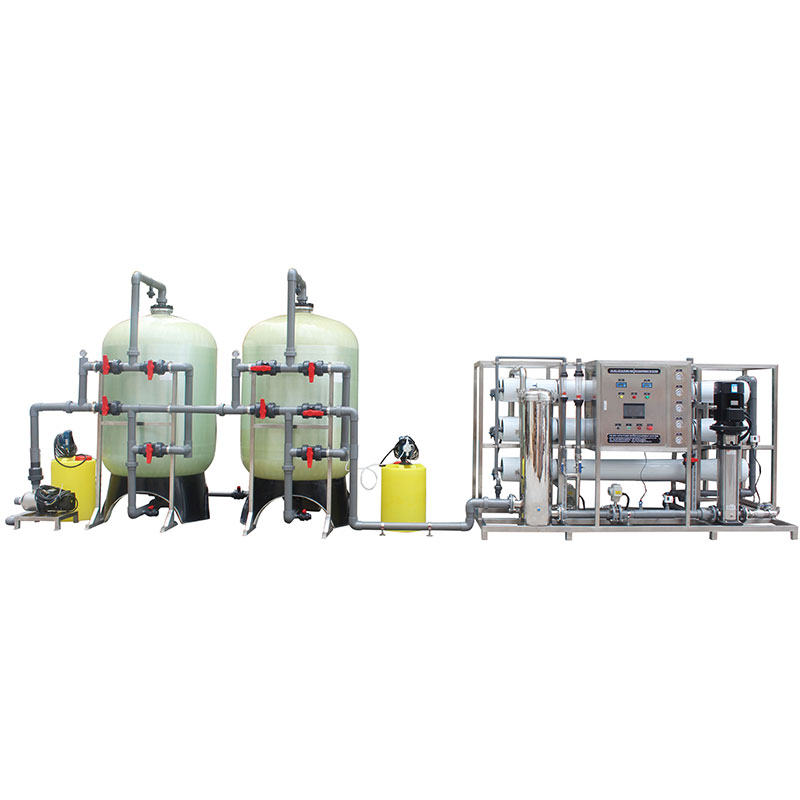What are commercial water filters made of?
In commercial environments, water quality management and treatment are critical to ensure product quality, equipment life, and customer satisfaction. Commercial water filters have become an indispensable equipment for many industries such as catering, hotels, factories, and laboratories due to their key role in removing impurities and improving water quality.
However, what materials are the wide variety of commercial water filters on the market made of? Which types of water filters are the most effective? This article will explore these questions in depth.

What are commercial water filters made of?
The core of commercial water filters lies in the material selection and design of their filter elements, which directly determine the efficiency and service life of the filter. The following are the main materials of common commercial water filters:
Activated carbon
Activated carbon is one of the most common materials in commercial water filters. It is formed by incomplete combustion of organic matter (such as coconut shells, coal, etc.) at high temperatures and has a highly porous structure. The main function of activated carbon is to adsorb organic matter, odor, chlorine, and some heavy metals in water. This material has become the first choice for many commercial water filters because of its low cost, strong adsorption capacity, and wide range of applications.
Advantages of activated carbon:
● High adsorption capacity, capable of removing a large amount of organic matter and chemicals from water.
● Effectively removes odors and odors.
● Widely applicable to various water quality conditions.
Disadvantages of activated carbon:
● Easy to saturate, filter element needs to be replaced regularly.
● Limited ability to remove microorganisms such as bacteria and viruses.
Polypropylene (PP) fiber
Polypropylene fiber is another common filter element material, usually used to make deep filters. PP fiber is formed by melt-blown technology and has excellent filtration performance, capable of intercepting suspended particles, sediments and some microorganisms in water.
Advantages of polypropylene (PP) fiber:
● High physical strength and chemical corrosion resistance.
● Effectively filter suspended matter and large particle impurities in water.
● High filtration efficiency and long service life.
Disadvantages of polypropylene (PP) fiber:
● Only suitable for filtering larger particles, ineffective for soluble pollutants.
Ceramic material
Ceramic filter elements also have a place in commercial water filters, especially in places with extremely high water quality requirements (such as laboratories, medical institutions, etc.). Ceramic materials have extremely small pores and can effectively filter bacteria, microorganisms and suspended particles in water. They also have strong antibacterial ability.
Advantages of ceramic materials:
● The pore size is extremely small, which can effectively remove bacteria and microorganisms.
● It can be cleaned and used repeatedly, and has a long service life.
● High temperature resistant, suitable for use in special environments.
Disadvantages of ceramic materials:
● Small flow rate and limited water treatment volume.
● Limited ability to remove soluble pollutants.
Ion exchange resin
Ion exchange resin is a synthetic organic polymer material, commonly used in commercial water filters for softening water. Through ion exchange reactions, the resin can remove calcium and magnesium ions in water, thereby reducing the hardness of water and preventing the formation of scale.
Advantages of ion exchange resin:
● It can effectively remove hardness ions in water and prevent scale.
● Simple operation and wide range of applications.
Disadvantages of ion exchange resin:
● The exchange capacity of the resin is limited and needs to be regenerated or replaced regularly.
● It can only remove specific types of ions and is ineffective for other pollutants.
Reverse Osmosis Membrane
Reverse osmosis membrane is a semi-permeable membrane widely used in high-end commercial water filters. It applies pressure in the water flow to allow water molecules to pass through the micropores of the membrane, while impurities and pollutants are trapped on the other side of the membrane.
Advantages of reverse osmosis membrane:
● It can effectively remove most soluble pollutants in water, including heavy metals, minerals and salts.
● Suitable for occasions with high precision requirements, such as medical, laboratory and high-end catering.
Disadvantages of reverse osmosis membrane:
● High cost, complex installation and maintenance.
● Generates a certain amount of wastewater.

What is the most effective type of commercial water filter?
After understanding the main material composition of commercial water filters, let's discuss which type of commercial water filter is the most effective. Different types of water filters have their specific application scenarios and filtering capabilities. The following are several common and effective types of commercial water filters:
Activated carbon filter
Activated carbon filter is one of the most common commercial water filters, widely used in catering, hotels and other industries. It uses the high adsorption capacity of activated carbon to effectively remove chlorine, odor, pigments and organic pollutants in water, and improve the taste and appearance of water.
Activated carbon filter applicable occasions:
● Catering industry (coffee shops, restaurants, etc.), used to improve the quality of drinking water and cooking water.
● Hotel industry, used to improve customers' drinking water experience.
Activated carbon filter advantages:
● High filtration efficiency, can significantly improve water quality.
● Low installation and maintenance costs.
Activated carbon filter disadvantages:
● The filter element needs to be replaced regularly to maintain the filtration effect.

Reverse osmosis (RO) system
The reverse osmosis system is one of the most advanced and efficient water treatment technologies currently available, capable of removing almost all dissolved solids, bacteria, viruses and organic matter. It is often used in commercial areas where extremely high water quality is required, such as medical institutions, laboratories and high-end catering industries.
Reverse osmosis (RO) system applicable occasions:
● Medical industry, used to prepare high-purity drinking water and medical water.
● Laboratories, used for operations with extremely high water quality requirements in experiments and analysis.
● High-end catering industry, used to make high-quality beverages and foods.
Reverse osmosis (RO) system advantages:
● Can provide the purest water quality, removing almost all pollutants in the water.
● Suitable for places that require high-precision water treatment.
Disadvantages of reverse osmosis (RO) system:
● High cost, complex installation and maintenance.
● Produces wastewater, which needs to be treated and discharged.
Ultraviolet (UV) sterilizer
An ultraviolet sterilizer is a device that uses ultraviolet beams to kill bacteria, viruses and other microorganisms in water. It is usually used in combination with other water filters as a last line of defense to ensure the sanitation and safety of water quality.
Applicable occasions for ultraviolet (UV) sterilizer:
● Medical industry, used to ensure the microbial safety of drinking water and medical water.
● Food processing industry, to ensure the microbial cleanliness of production water.
Advantages of ultraviolet (UV) sterilizer:
● Can effectively kill microorganisms in water and ensure the sanitation and safety of water.
● Does not change the chemical composition of water and maintains the original water quality.
Disadvantages of ultraviolet (UV) sterilizer:
● Need to be used in combination with other filtering equipment to remove physical and chemical pollutants.
● UV lamps need to be replaced regularly.
Ion exchange system
Ion exchange system is mainly used for water softening treatment and is widely used in commercial places where scale formation needs to be avoided, such as catering equipment, boiler systems and industrial production lines. It removes calcium and magnesium ions from water through ion exchange resins, thereby reducing the hardness of water.
Applicable occasions for ion exchange system:
● Catering industry (especially places using equipment such as steam equipment and coffee machines) to prevent equipment from being damaged by scale.
● Industrial production lines, it is necessary to keep the equipment free of scale deposits.
Advantages of ion exchange system:
● It can significantly reduce the hardness of water and extend the service life of equipment.
● Simple operation and low maintenance cost.
Disadvantages of ion exchange system
● It is only effective for specific ions and is ineffective for other pollutants.
● The resin needs to be regenerated regularly to maintain its function.

How to choose a suitable commercial water filter?
Choosing a suitable commercial water filter requires considering multiple factors, including water quality conditions, usage environment, required water treatment volume, and budget. Water quality varies greatly in different regions, and the water may contain different pollutants, such as hard water, rust, chlorine, heavy metals, etc. Before choosing a water filter, the water quality should be analyzed to determine the main types of pollutants, so that a targeted water filter can be selected.
In addition, the choice of water filter should also take into account the use environment. For example, the catering industry usually needs to improve the taste and odor of water, so activated carbon filters are a good choice; for laboratories or medical institutions that require high-purity water quality, reverse osmosis systems are more suitable. Different types of water filters vary in the amount of water they can process. For commercial environments that require a large amount of water, such as restaurants, hotels, and factories, it is crucial to choose a water filter with a higher processing capacity to ensure that it can meet daily water needs without affecting water quality.
Finally, the initial installation cost and subsequent maintenance cost of commercial water filters are also factors that need to be considered. Although some high-end water filters such as reverse osmosis systems provide better water quality, their installation and maintenance costs are high. In comparison, activated carbon water filters and polypropylene fiber filters are lower in cost, but may require frequent filter element replacement.
In summary, activated carbon, polypropylene fiber, ceramic materials, ion exchange resins, and reverse osmosis membranes are common filter element materials, each with its own advantages and disadvantages. When choosing a commercial water filter, reverse osmosis systems, activated carbon filters, UV sterilizers, and ion exchange systems are some of the most effective options. They are suitable for different usage scenarios to meet different water treatment needs.






